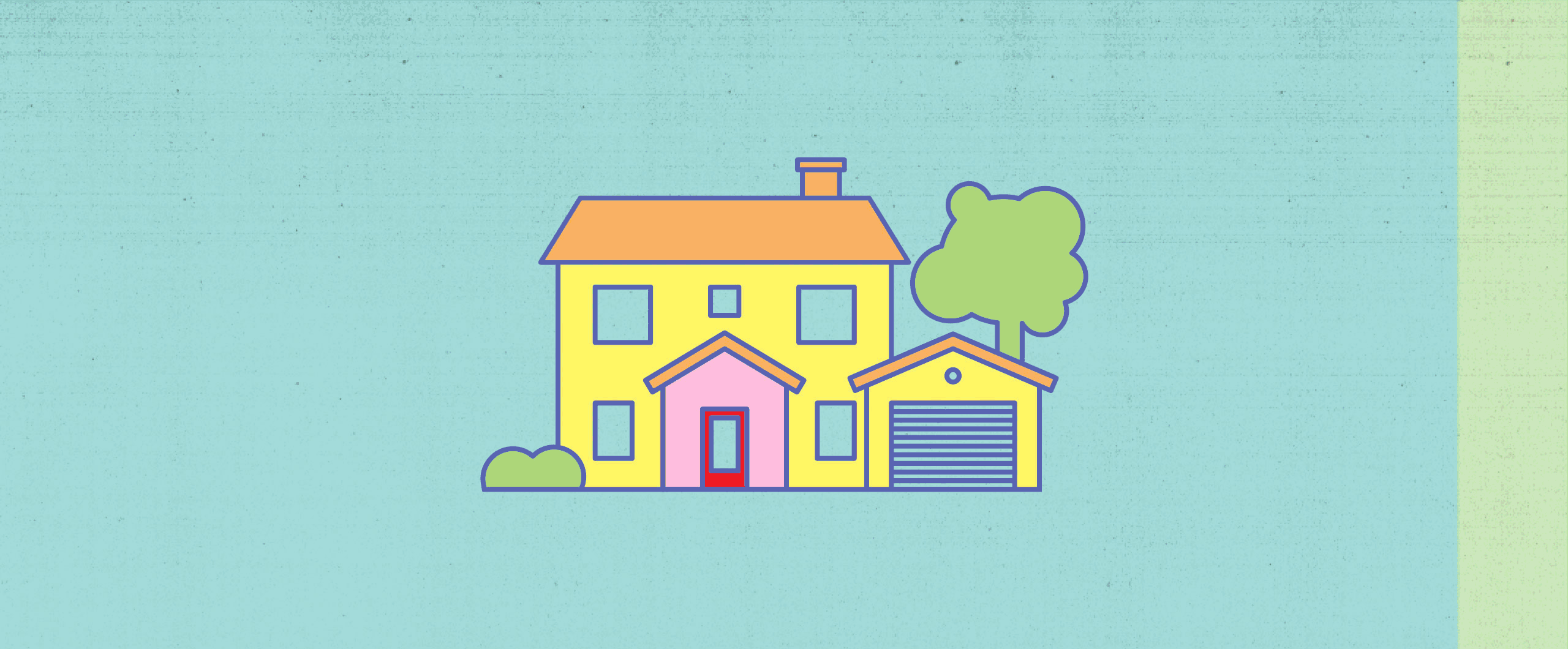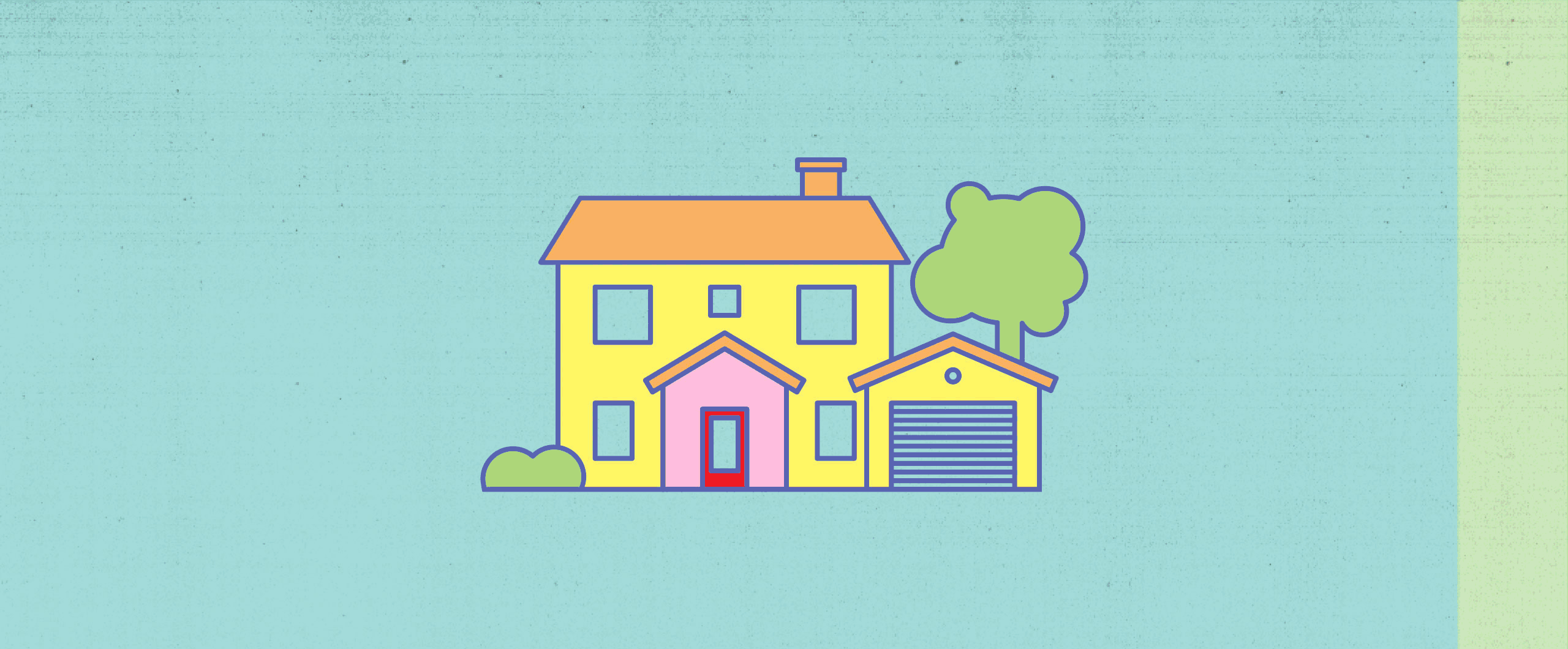The Joy of Downsizing
After decades of uneasy homeownership, my wife and I moved into a small apartment and discovered that the Sages were right




After my rabbinic ordination in 1982, my wife and I spent the next 12 years living in synagogue parsonages. That suited me just fine. I never felt fit to be a homeowner. I could handle a hammer, nails, and screwdriver, and that was about it. So living in synagogue-owned homes was perfect for me. If something went wrong in the house, all I had to do was call the congregation’s house chairman and it would be fixed.
Another benefit: Fresh out of rabbinical school at age 29, here I was living with my spouse in a lovely three-bedroom home at the end of a cul de sac in Columbus, Georgia. I never could have afforded such a house at that age—nor did I really know what to do with all the space. We started to accumulate furniture, artwork, gadgets, and decorative objects. Then we moved to Wayne, New Jersey, this time into a four-bedroom parsonage. Our family was growing, so we accumulated children’s bedroom furniture, toys, and more gadgets.
Finally, I accepted a position in greater New Haven, Connecticut, in a congregation that owned no home for its clergy; I was paid a higher salary, but I was expected to purchase my own house. On the plus side, we were able to choose our own place, in a great neighborhood, again at the end of a cul de sac, and we could choose any appliances or home improvements that were affordable. The minuses: When anything needed fixing, I had to pick up a pen and write a check for someone else’s services.
Meanwhile, we continued to accumulate things for almost 25 more years. We were never hoarders but we were as reluctant to throw stuff away as most people. We rarely bought new furniture unless necessary. Appliances hung around until they broke and needed replacement. We never felt compelled to have the newest and finest of anything. I never thought my possessions were much of a burden, but I considered the house itself a burden.
Our house had neither sewer nor city water service. That meant maintaining a septic system and a well. Within a few years after our move, we realized the septic system needed an overhaul. (I’ll spare you the details!) That cost around $20,000. We found out we had to have the underground oil tank dug out. Another several hundred dollars. We spent thousands of dollars on well and water-related needs, and another several thousand on a basement leakproof system. We put in a built-in generator after suffering through two prolonged power outages. Another big expense. And on top of all that, a new driveway, a new roof, a chimney repair, new windows, gutters, repairing and staining the back deck, two exterior paint jobs. Plus refurbishments of our two bathrooms and the construction of a finished basement. We were sinking a lot of money into the house and didn’t feel that it was improving our lives. I worried about the hidden house-related problems that threatened to erupt at any time.
Every so often, the words of Hillel would resonate in my ear: “The more possessions, the more worries.” (Pirkei Avot 2:8) The moveable goods I owned didn’t fret me so much. The totality of home ownership was what increasingly irked me. It’s not that I had so much. I just had way more than I needed. And whatever I had was becoming more burdensome. I felt oppressed by my house.
*
The idea of downsizing started to grow on me a few years ago. I had left the full-time pulpit, started working as a counselor in a drug/alcohol treatment center, and took a part-time synagogue position 45 minutes away from my home. I had less free time than before. The stress of juggling two different kinds of work started to weigh on me. I started to feel that the benefits of living in our house were becoming outweighed by the deficits.
Eventually, my wife and I started to realize that we weren’t trapped. She helped manage her widowed mother’s two downsize operations: one from a larger house to an apartment, the second from her apartment to an assisted-living situation. Through those experiences, my wife came to see that downsizing is doable. Meanwhile, I was increasingly stressed by my work and anxious about my house. So together, we began to wonder what it would be like to move out of our house into a smaller place. In the earliest planning stage, I realized I needed to unload a good portion of my rabbinic library, a library no bigger than that of most rabbis, perhaps even smaller, but more than I needed. Over the course of two years, I found worthy recipients of many of my books, and I was happy to help the books find homes among those who would use and appreciate them.
Then my daughter and son-in-law got married in June 2018. Several months before that date, we had casually mentioned the idea of their buying our house—the house where my daughter grew up—so we could downsize and move to a smaller place. We offered to sell them the house for basically whatever we’d owe at the time of sale. They jumped on the idea. They immediately started to plan how they would reconfigure the kitchen/living room/dining room area. My son-in-law, unlike me, is exceptionally handy and his uncle is a building contractor. Also unlike me, he is more than fit and qualified to own and maintain a home.
My modest vision involved living in an apartment or condo where all maintenance needs would be easily met. We would sell or give away many of our possessions and learn to live with less. Less space, less worldly goods. Just as Hillel would like. The fewer the possessions, the fewer the worries. At this time in my life, in my mid 60s, it seemed wise to seek ways to reduce stress. Not knowing how many years I have left, why not try to live healthy?
Here’s another teaching from Pirkei Avot, this time from Rabbi Eliezer: “Repent [Hebrew shuv, referring to Teshuvah] one day before your death,” (2:15). The Talmud (Shabbat 153a) adds that his students asked: “How can a person know the day of his death?” Rabbi Eliezer’s answer: “So repent each day, lest you die tomorrow.”
I hope I will live many more years. But I might as well try to improve my health, lower my stress, and simplify my life every day, lest it be my last.
So my wife and I, together with our children, devised a plan for a smooth handoff of the house where we had lived for 25 years. While I was unloading my books over a year ago, we rented a dumpster and began to liberally discard stuff we no longer needed. We hired a downsize manager who organized an online estate sale/auction. Almost everything sold, some things for as little as a dollar. (The upright piano went for $4!)
We started looking for apartments. Although we knew we were getting rid of so much, we still needed to find a place with sufficient storage to suit anyone moving from a larger house. We eventually found such an arrangement, a two-bedroom apartment with two sizable walk-in closets and a rentable storage cube. Don’t get the impression that we gave almost everything away and opted for a Spartan existence. We still held onto enough to require some extra storage space.
We are now settling into our new apartment. (Three whole days after we vacated our house, our children began to move in.) I have to admit that it is a major adjustment. We are securely ensconced in our 1,300-square-foot flat. My wife and I have no regrets, and we are deeply gratified to see our children taking the opportunity to live in a place they can afford, where they will raise a family and thrive.
As nice as it is to observe their process in the new surroundings, we are not now—nor were we ever—primarily motivated by the need to sacrifice our comforts for the sake of our children. Despite many of our friends’ assumptions that we were doing something very generous for our children’s sake, we did all this—the downsizing, the moving, the sale well below cost—primarily for ourselves. The motivation was, and is, to reduce property and possessions and to thereby lower stress and anxiety. In this respect, everybody wins, and everybody gets their needs met. And If I am healthier and happier and they are more comfortable and secure, who can complain?
Now that the project is completed, my wife and I feel immense relief. The yoke of home ownership has been cast off our backs. No longer are we paying someone to regularly clean our house. I’m even enjoying taking those tasks on myself. It feels like I’m back in college and rabbinical school, doing the sinks, tubs, and toilets, mopping and vacuuming the floors. Now, minus the responsibilities of the house, I’m reverting back to the days of my youth. It’s a lovely sensation.
As ill-suited as I may have been to own and manage a house, I consider myself to have been most fortunate. I have no regrets about the 25 years I spent there. I have no regrets about having downsized and moving to a smaller place. At this stage in my life, with fewer possessions and less to worry about, I feel emotionally freer and spiritually enriched. The oft-quoted saying of Ben Zoma (Pirkei Avot 4:1) has new meaning for me now: “Who is rich? One who is content with one’s lot.”
Rabbi Richard L. Eisenberg is a certified addictions counselor and retired pulpit rabbi.